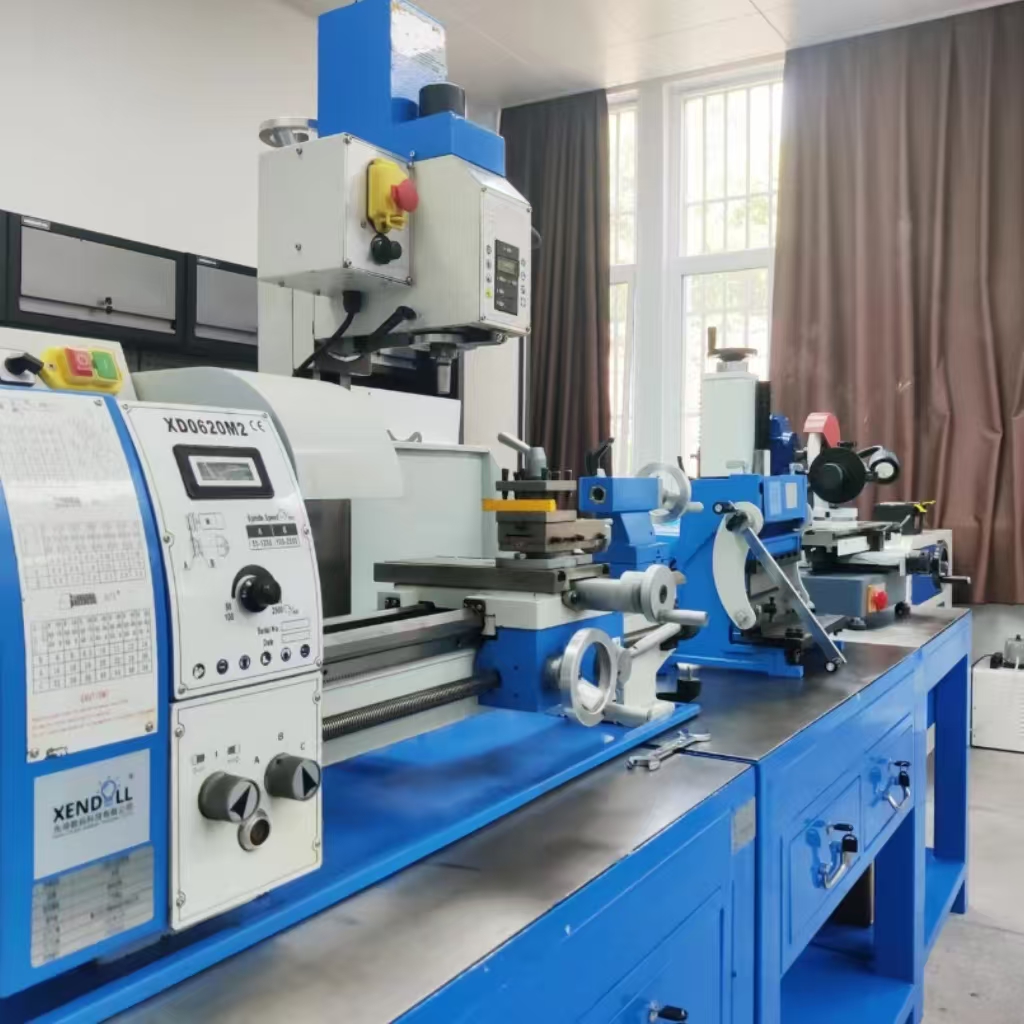Blog
Xendoll has 22 years of experience in the production of small machine tools. We will help you choose the suitable machine and share our experience in CNC machining with you.
 May 07, 2025
May 07, 2025

 1049
1049
When it comes to precision machining, lathes are indispensable tools for professionals and hobbyists alike. However, not all lathes are created equal. The differences in design, functionality, and performance can significantly impact productivity, accuracy, and user experience. For mechanical distributors, educational equipment suppliers, and machining enthusiasts, understanding these distinctions is critical to making informed purchasing decisions.
1. Precision and Accuracy: The Foundation of Superior Machining
A lathe’s ability to deliver precise cuts is paramount, especially for complex projects or high-tolerance components. Premium lathes distinguish themselves through advanced engineering that minimizes vibration and ensures stable operation. For instance, Xendoll Tools’ lathes feature hardened steel guide rails and precision-ground components, which reduce deflection during machining. This translates to smoother finishes and tighter tolerances.
One often overlooked yet critical factor influencing precision is the feed rate—the speed at which the cutting tool moves relative to the workpiece. Lower-quality lathes may struggle to maintain consistent feed rates under heavy loads, leading to uneven cuts or tool wear. In contrast, Xendoll lathes incorporate variable-speed motors and digital controls, allowing users to optimize feed rates for different materials (e.g., aluminum vs. stainless steel). This adaptability ensures flawless results, whether you’re crafting delicate prototypes or robust industrial parts.

2. Enhanced Efficiency Through Optimized Feed Rates
Efficiency isn’t just about speed—it’s about maximizing output without compromising quality. High-performance lathes excel here by integrating features that streamline workflows. A standout advantage is their ability to maintain optimal feed rates across diverse applications. For example, when machining soft materials like brass, faster feed rates reduce cycle times, while slower, controlled rates prevent chattering in harder metals like titanium.
Xendoll Tools’ lathes take this a step further with programmable settings. Users can predefine feed rates and spindle speeds for repetitive tasks, minimizing manual adjustments and human error. This is particularly valuable for mechanical distributors handling bulk orders or educators teaching students the nuances of CNC operations. By automating these parameters, businesses save time and resources, ultimately boosting profitability.
A lathe is a long-term investment, and durability directly impacts its lifecycle cost. Cheaper models often use inferior materials or lack robust cooling systems, leading to premature wear—especially under high-stress conditions. Premium lathes, however, prioritize longevity. Xendoll Tools’ machines, for instance, employ cast iron frames and corrosion-resistant coatings to withstand heavy daily use.
Durability also ties into feed rate management. Aggressive cutting at improper feed rates generates excess heat, accelerating tool degradation. Xendoll lathes mitigate this risk with built-in thermal protection and lubrication systems. These features not only extend tool life but also reduce maintenance costs over time—a key selling point for cost-conscious buyers like overseas distributors or small workshops.
Not all lathes are designed to handle a wide range of tasks. Budget models may excel in specific scenarios but falter when faced with unconventional projects. High-end lathes, on the other hand, offer unmatched versatility. Xendoll Tools’ lathes support multiple machining modes, including turning, threading, and knurling, making them ideal for diverse industries—from automotive parts manufacturing to educational workshops.
This adaptability is enhanced by adjustable feed rates. For example, slow, precise feed rates are ideal for threading operations, while faster rates suit roughing cuts. The ability to fine-tune these parameters ensures that users can tackle everything from intricate jewelry designs to heavy-duty metal components with a single machine.

Finally, premium lathes prioritize user experience. Ergonomic designs, intuitive controls, and safety features like emergency stop buttons are standard in machines like those from Xendoll Tools. These elements are especially important for educational institutions training future machinists or hobbyists working in home workshops.
Advanced models also simplify feed rate adjustments. Instead of relying on manual calculations, digital displays provide real-time feedback, helping users avoid mistakes that could damage the workpiece or machine. Such innovations lower the learning curve for newcomers while empowering experts to push the limits of their creativity.
The advantages of a high-quality lathe over a standard model are clear: unmatched precision, efficiency, durability, versatility, and user safety. By prioritizing factors like feed rate control and robust engineering, Xendoll Tools’ lathes deliver exceptional value to mechanical distributors, educators, and machining enthusiasts worldwide.
Whether you’re sourcing equipment for a dealership, outfitting a classroom, or upgrading your personal workshop, choosing a lathe that excels in these areas ensures long-term success. Visit xendolltools.com to explore our range of premium mini-lathes and discover how our solutions can elevate your machining capabilities.



 Show all our samples
Show all our samples
 Provide you with a free quote
Provide you with a free quote
 Answer all the questions you may have
Answer all the questions you may have
 Guided installation and other options
Guided installation and other options